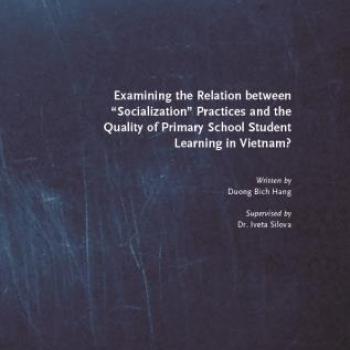Publication Information

This paper seeks a deeper understanding of Vietnam's education 'socialization' policy, and the broader context (and policy discourse) within which the policy has been forged and implemented. It also aims to investigate how institutionalized practices of 'socialization' affect student learning quality. Using Young Lives school survey data conducted in 2011 and 2012, the study investigates the associations between whether students paid for full-day schooling, which represents family expenditures on education, and private tutoring hours (predictors), and student learning quality, as characterized by academic achievement, confidence, and effort (outcome variables). The findings reveal that spending on full-day schooling was not associated with the difference in primary school students' academic achievement and confidence, but it had a positive relation with students' effort. Also, the number of private tutoring hours was not a significant predictor of student learning quality. However, attending 'extra classes' continued to be commonplace at the primary education level even in the rural, remote areas.
The findings suggest that an increased amount of money channeled from household contributions through school fees does not necessarily lead to better learning quality. The study concludes by raising some important equity concerns that result from institutionalized 'socialization' practices.

This paper seeks a deeper understanding of Vietnam's education 'socialization' policy, and the broader context (and policy discourse) within which the policy has been forged and implemented. It also aims to investigate how institutionalized practices of 'socialization' affect student learning quality. Using Young Lives school survey data conducted in 2011 and 2012, the study investigates the associations between whether students paid for full-day schooling, which represents family expenditures on education, and private tutoring hours (predictors), and student learning quality, as characterized by academic achievement, confidence, and effort (outcome variables). The findings reveal that spending on full-day schooling was not associated with the difference in primary school students' academic achievement and confidence, but it had a positive relation with students' effort. Also, the number of private tutoring hours was not a significant predictor of student learning quality. However, attending 'extra classes' continued to be commonplace at the primary education level even in the rural, remote areas.
The findings suggest that an increased amount of money channeled from household contributions through school fees does not necessarily lead to better learning quality. The study concludes by raising some important equity concerns that result from institutionalized 'socialization' practices.

